Are you ready for your first ERP?
Companies move to their first ERP system for various reasons. Some start-ups jump straight in because they know that, if they grow as fast as they want to, ERP will be essential very quickly. Others, on a slow but steady growth pattern, may know that they are approaching a point where relying on an accounting system and spreadsheet-based manual systems is becoming unsustainable. But such companies lack experience of ERP systems; simply because they have ever had one. If they have people within the company that do have experience of ERP, through working in other companies, that can be helpful but can also be problematic because those people may be bringing with them the experience of only one ERP system, used at only one company.
If that was a bad experience, they are likely to have also brought with them a degree of pessimism and negativity. Equally a problem, if they have moved from a larger company that had a Tier 1 or Tier 2 system (see another blog on this website for an explanation of ERP tiers), they may well have brought with them unrealistic expectations for a company that can only afford a Tier 3. To put that into context; companies implementing a Tier 1 system typically spend tens or hundreds of millions of dollars: how many SMBs/SMEs can afford even a fraction of that? And the thing is that they shouldn't, because some very capable Tier 3s, that are a better fit for their needs, are available for a fraction of the price.
Matters can be further complicated because not all systems labeled ERP actually are ERP. Many companies that offer very good accounting systems, also offer larger systems that have some rudimentary buy/stock/assemble/sell functionality added, and they sell these as 'ERP' (we can usefully call these systems “Accounting+”), so first time buyers can spend appreciable amounts of money and end up with a system that doesn't, and can't, give them the benefits they expected.
So the first thing for companies to do is to find out for themselves exactly what ERP is, what it can do for them and, perhaps even more importantly what it can't do for them. A good starting point, given that the term ERP (Enterprise Requirements Planning) was originally coined by Gartner Group, would be their definition of it. Their website says that ERP is, “an integrated suite of business applications....covering broad and deep operational end-to-end processes, such as those found in finance, HR, distribution, manufacturing, service and the supply chain”.
That says that an ERP system includes an HR system, but an HR system is not ERP. It says that an ERP system includes an inventory control system, but an inventory control system is not ERP. And it says that an ERP system includes an accounting system, but an accounting system is not ERP. In fact, none of these things make up more than 15% of an ERP system.
Now; there is absolutely nothing wrong with a company buying just an HR system, or just an inventory control system, or just an accounting system if that is all they want or need. But an HR system is not going to reduce purchasing costs, an inventory control system is not going to reduce delivery lead times to customers, and an accounting system is not going to increase efficiency on the shop floor so, if that is all companies want and need, they should be looking at specialist HR, inventory control or accounting systems. And they should not be paying ERP prices for them.
All of the above systems can deliver localized productivity or efficiency improvements but none alone can do what an integrated ERP system can do. A number of articles on this website explore using ERP for cost reduction in purchasing, inventory management, manufacturing and administration, and also at increasing profitability (not always the same thing as cost reduction). ERP can do these things because it covers every function within the business and because, when implemented intelligently, it optimizes the way the whole organization works (strengthening just one link in a chain does not necessarily strengthen the chain). But, for an integrated system to work properly, the organization itself must also be integrated, and that means that it must have matured to the point where individual departments can work together almost seamlessly.
Here are some words that are used when talking about ERP: teamwork, discipline, data accuracy, and compromise. The problem is that these are not things that ERP delivers: they are things that ERP needs to do its job properly. If a company has departments that want to operate as much as possible in isolation, ERP can't pull them together. If it has people who feel too busy to stick to procedures, ERP can't make them. If it doesn't have clean data, ERP can't cleanse it for them. And if they have departments that see themselves as having needs or preferences that over-ride the needs and preferences of others, then ERP can't do what senior management has failed to do.
So, before a company starts its first ERP journey, it has to ask itself some questions:
- has it, and its entire senior management team, reached the level of maturity required for the project to be successful,
- is it comfortable with spending the amount of money that will be required to do the job properly (a company implementing its first ERP system will typically spend an amount equivalent to between three and five percent of its annual turnover), and
- is it prepared for the changes that will be required in order to operate an integrated system efficiently and effectively?
There is plenty of help available to help companies succeed (not least on this website) but they have to want to succeed and to recognize that for things to be different, things have to change. Launching into an ERP project halfheartedly, or trying to do it on the cheap, are two excellent ways of ensuring that objectives will not be met and that the investment, in terms of time, money and effort, will have been futile.
Free white paper
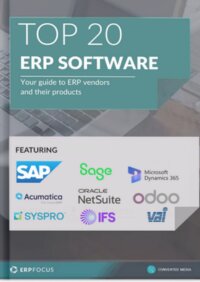
Top 20 ERP Software Comparison
Compare the top ERP systems using this guide
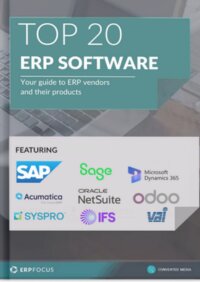
Featured white papers
-
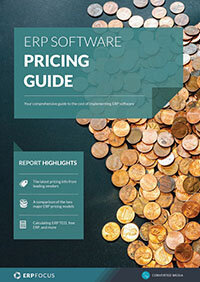
ERP Software Pricing Guide
Get the latest pricing information on over 80 popular ERP systems, and learn how to budget for your ERP project in our free guide
Download -
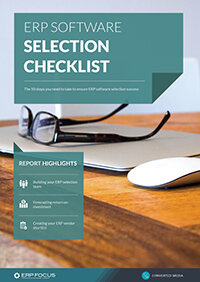
60-Step ERP Selection Checklist
Get the comprehensive checklist for your ERP selection project
Download -
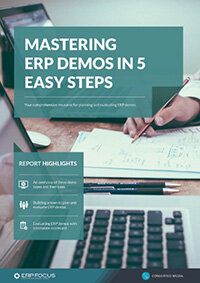
ERP Demo Guide & Scorecard
Master your ERP demo with 5 easy steps using our free guide (includes demo scorecard)
Download
Related articles
-

The best ERP systems for process manufacturing
Consider these ERP systems when selecting your next process manufacturing ERP
-

CMMC Compliance: What Aerospace and Defense Manufacturers Need to Know
Key insights on CMMC compliance, deadlines, and securing DoD contracts with CMMC 2.0 certificatio...
-

5 ERP pricing definitions you need to understand
Have you mastered the ERP pricing lexicon yet? Getting to grips with these five definitions is a ...

